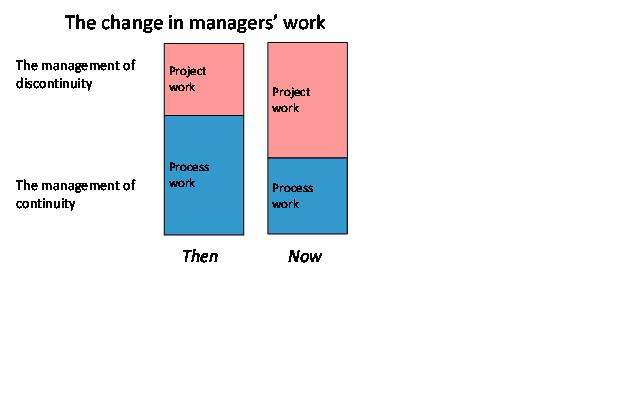

Consultant thinking: Why consulting skills are an essential part of management training
A large number of our clients are not consulting practices and many of the participants in our training courses are not consultants. Consulting skills are now seen by many forward thinking organisations as an essential element of management training and this short article explains why this is the case.
Managing discontinuity
Go back 30 years before the widespread use of computers in businesses, and administrative procedures were largely manual. Offices were run as factories that processed paperwork and the job of a manager was to keep things going - the management of continuity. "Management by exception" was a common process; the task of the manager was to ensure that administrative processes were followed and matters restored should there be departures from the norm.
Where change was needed, there would have been internal specialist resources to call on, such as the management services department. So management training for the average line manager was largely about managing continuity.
Fast forward to today and times have changed as shown in the figure below.
Now managing discontinuity is a much larger part of a manager's job. Continuous improvement is expected, whether the agenda is developed by the manager or imposed from outside.
The diagram also shows the difference in the kind of work that is undertaken by managers; managing continuity is about process and is ongoing: although work is going well today, it still needs managing. Managing discontinuity is different; it is about change and is usually undertaken through projects, which unlike process work have a beginning and an end.
Management standards developed by the Management Standards Centre cite the management of change as being an essential component of management competence and training; the model they use is shown below.
Consultants are, of course, agents of change and so the skills required by managers to facilitate change do of course overlap with those of a consultant:
- consultants deliver value through projects; managers manage discontinuity through projects
- consultants work in ad hoc teams; likewise, managers may need to form ad hoc teams with people who are not immediate colleagues to work on projects
- consultants cannot command change; they have to accomplish it through persuasion and influence. Likewise, the option of command and control as a way of creating change may not be open to line managers if they want genuine commitment
- consultants might be working only part time on a specific project and have to accommodate it with other demands on their time; the same is true of managers working on change projects
There are probably other similarities between the two roles. So management training should include training for managing discontinuity, and the skills needed for this are largely those required of a consultant. From a consultant's point of view, these skills would include:
- situation analysis and problem solving - arriving at a clear understanding of a situation, recognising that there may be some fact-finding needed before you can reach a conclusion about the real nature of the problem, let alone what the solution might be
- project design, which not only accomplishes the results needed but does so with effective management of resources and risk
- implementation, understanding the essential elements of change and how to get commitment to it
It is also very likely that a manager would need to hire and work alongside consultants during the course of their career and so understanding how they work is of advantage.
Needless to say, we at Elevation Learning provide training in all aspects of consulting skills and can contribute this to the training of managers for the 21st century.

